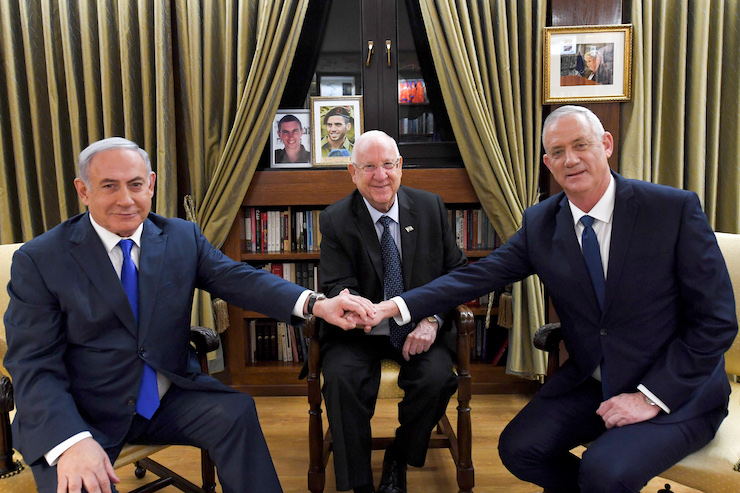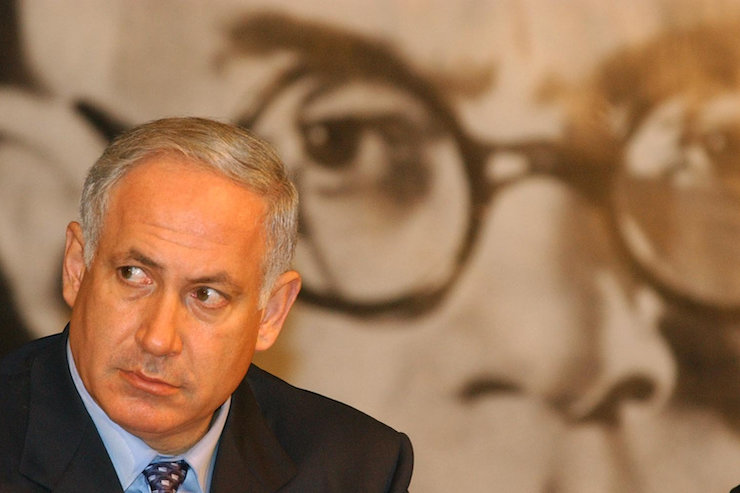Israel’s elections have been billed as a clash of the titans between Netanyahu and Gantz. But no matter who wins, the real victory goes to Vladimir Jabotinsky, the grandfather of the Likud.

In what should be regarded as a historic photograph taken last Monday, Prime Minister Benjamin Netanyahu, the head of the Likud party, and Benny Gantz, the head of the Blue and White party, sat gripping one another’s hands for the camera with President Reuven Rivlin, who was arbitrating their meeting in his Jerusalem office. Rivlin, himself a former Likud member, was urging the two leaders to form a national unity government following last week’s election results, which saw their parties win a combined total of 65 Knesset seats out of 120 (32 and 33 seats, respectively).
The irony is that, despite their bitter rivalry during the election campaigns, the platforms of Likud and Blue and White are almost identical. Their main sticking point revolves around who should become prime minister; indeed, had Gantz not made Netanyahu’s personal overthrow a centerpiece of his campaign, he could have been a natural coalition partner. With talks at an impasse, Rivlin on Wednesday appointed Netanyahu — whose 55-seat bloc is just slightly ahead of Gantz’s 54 — to create a government; if he fails, the task will be reassigned to Gantz.
The narcissism of small differences in what has become the biggest battle in Israeli politics is not an accident. The meeting in Rivlin’s office was decades in the making, and marks a resounding victory for the legacy of Vladimir (Ze’ev) Jabotinsky — the founder of Revisionist Zionism, commander of the Irgun militia, and grandfather of the Likud.
Jabotinsky may have been furious that the fate of the Jewish state has been held hostage to an individualized battle between ideological twins. But the fact that the two parties are nearly indistinguishable from each other, and now account for over half of the political echelon, attests to the Likud’s profound transformation of Israeli state and society.
When it broke the Labor party’s hegemony in 1977, the Likud encouraged Israelis to believe that they no longer had to hide behind discursive façades to pursue Jewish sovereignty throughout ‘Greater Israel.’ “Our habit,” wrote Jabotinsky in an essay in 1911, “of constantly and zealously answering to any rabble has already done us a lot of harm and will do much more. We do not have to apologize for anything.” Armed with a clear and unrepentant ideology, the Likud gradually produced a new generation of leaders that supplanted the old guard of Labor Zionists. And as the years passed, the latter found it difficult to resolve the contradictions of their fragile philosophy, or to mitigate their anxiety over foreign scrutiny.
While Israel’s four Likud prime ministers — Menachem Begin, Yitzhak Shamir, Ariel Sharon, and Netanyahu – were chief inheritors of Jabotinsky’s teachings, his influence soon rippled across the political spectrum. By the previous Knesset of 2015-2019, nearly every major Jewish party from far-right to center-left was led by a former senior member of Likud. These include Avigdor Liberman (Yisrael Beitenu), Naftali Bennett (Jewish Home), Moshe Kahlon (Kulanu), and Tzipi Livni (Hatnuah). Those who entered politics through other parties — like Isaac Herzog (Labor), his successor Avi Gabbay, and Yair Lapid (Yesh Atid) — did everything they could to sound like the Likud.

It was Netanyahu’s tenure, however, that solidified the right’s usurpation of the political landscape. Since returning to office in 2009, “King Bibi” proved that Israel could maintain draconian rule over Palestinians in the occupied territories, while providing stability and prosperity for Israeli citizens. Knowing that the U.S. and E.U. would do little to punish his deviations from the “peace process,” Netanyahu stretched the boundaries of Israel’s political norms to fulfill the right’s maximalist ambitions (and his own personal ventures).
The past decade thus disproved the adage, still wearily repeated by the Zionist left and the international community, that Israel couldn’t survive without ending the occupation and adhering to democratic principles. In fact, Israel has thrived by doing the opposite. Even Israelis who disapproved of Netanyahu’s ideology, or begrudged his corruption scandals, couldn’t deny that the right’s policies had gifted them with a high degree of command over their lives — and over their occupied Palestinian subjects — at relatively little cost.
The right’s persistence paid off. The groundwork has been laid for the formal annexation of West Bank settlements and the enshrinement of Jewish supremacy between the river and the sea, bolstered by the passing of the Jewish Nation-State Law last year. Today, the limited international pressure that once dogged Israeli leaders has been replaced by the open support of the likes of Donald Trump, Narendra Modi, Viktor Orbàn, and Jair Bolsanaro. With the “status quo” so advantageous, why would Israelis opt for something different?
It’s no wonder, then, that Blue and White is essentially a replica of the Likud: it offers Israelis continuity, but without the personal drama and demagoguery of Netanyahu. That’s why, for many Palestinians, the prospect of Netanyahu’s defeat stirs much dread instead of hope. For all his worsening policies, the prime minister has been a major asset to the Palestinian cause. His blatant rhetoric and alliances with fascists at home and abroad have boosted awareness of Israel’s practices, splintered its ties with American Jews, and catalyzed grassroots action for Palestinian rights.
Many now fear that a Gantz victory would merely convince the world that Israel has “returned” to more progressive politics, and thus would alleviate the pressure that’s been building over the past decade. But there is no going back to a “pre-Netanyahu” era. The Likud hasn’t only dominated Israeli political thought: it has facilitated and mainstreamed the rise of parties and movements that are even more nationalistic, religious, and racist than itself.
These right-wing actors regularly clash and compete with one another; but now, in a historical coup, they have upended the opposition and absorbed the Zionist left — which never was a bastion of democratic politics — into their Revisionist world. Without consequences for their descent into the far-right, Israeli leaders across the board have every reason to ignore any “rabble” against the supremacist vision that Jabotinsky preached for. Until those consequences come: welcome to Likud Nation.

